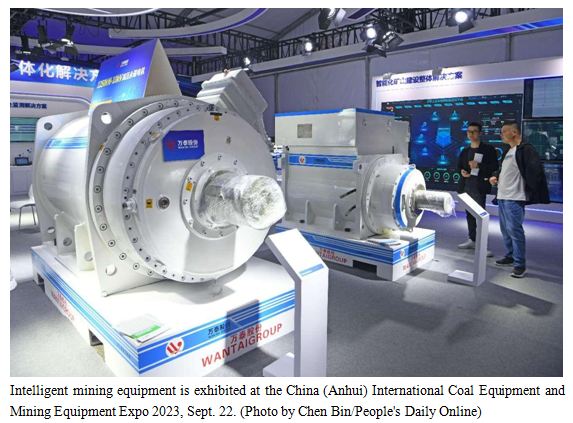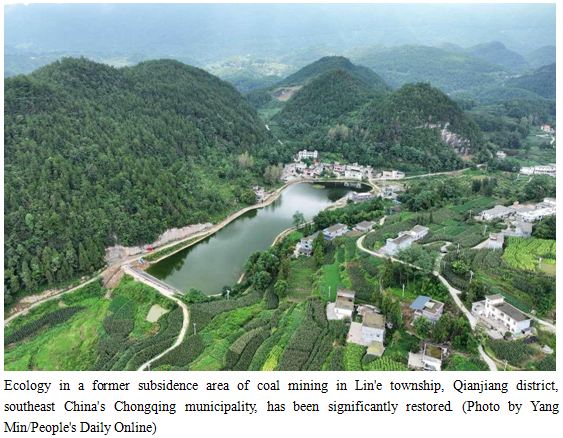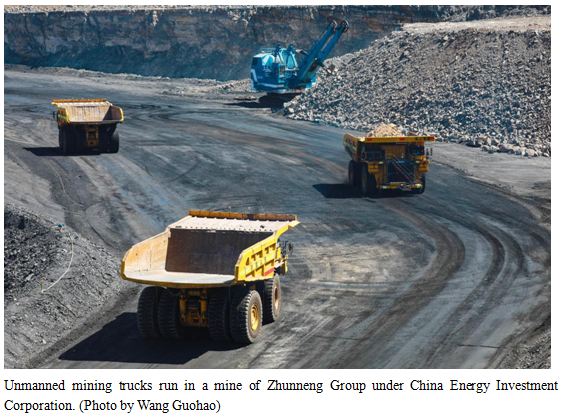By Ding Yiting, People’s Daily
As an important traditional source of energy in China, coal accounted for about 56 percent of the total domestic energy consumption annually. The coal industry has contributed significantly to China’s economic and social development.
However, it has also been criticized as wasteful and highly polluting.
In recent years, China has been actively promoting supply-side structural reform in its coal industry, promoting cleaner and more efficient use of coal, and working to transform the industry toward high-end, intelligent, and green development.
Zhunneng Group under China Energy Investment Corporation has developed a coal-derived nano-hydrocarbon fuel, a viscous black liquid made from coal, water and a small amount of additives through nanosizing processes.
“This type of fuel has a low fire point and can sustain autonomous stable combustion, significantly reducing coal consumption for thermal power plants,” said an executive with Zhunneng Group.
According to the executive, the potential applications of the newly developed fuel span multiple fields, including explosives, fuel substitution, and coal gasification.
A coal chemical enterprise, after using the new type of fuel, has seen increasing production of syngas, resulting in an additional revenue of approximately 200 million yuan ($27.48 million) each year, the executive told People’s Daily.
Zhang Hong, spokesperson of the China National Coal Association, noted that as the energy attribute of coal reaches its peak, there will be increasing emphasis on utilizing coal more as an industrial raw material.
According to him, many enterprises choose to improve the comprehensive utilization efficiency of coal as a raw material to develop high value-added, refined, and differentiated products, promoting high-end, diversified, and low-carbon development of the coal chemical industry.
According to incomplete statistics, in 2022, China’s coal-to-oil, coal-to-gas, coal-to-olefin, and coal-to-ethylene glycol production capacities reached 9.31 million tons, 6.125 billion cubic meters, 16.72 million tons, and 11.55 million tons, respectively. The comprehensive utilization efficiency of coal as a chemical raw material continued to improve.
In terraced open-pit mines in Erdos, north China’s Inner Mongolia autonomous region, unmanned mining trucks with a capacity of 330 tons were seen running to an unloading area 2.5 kilometers away, carrying mineral soil stripped by electric shovels.
These trucks were a safer alternative to manned mining trucks, said Guo Pei, manager of the intelligent construction management center of the Heidaigou open-pit coal mine of Zhunneng Group.
According to him, manned trucks, which are often large and have many blind spots, pose greater safety risks for drivers particularly during nighttime or in bad weather. Equipped with advanced technologies such as LiDAR, millimeter-wave radars, and digital twins, these unmanned trucks can autonomously plan routes and accurately park for unloading. Moreover, their speed is comparable to that of manned trucks.
By inputting information like coal rock and bench parameters, an intelligent drilling and blasting system can improve borehole precision to within 5 centimeters.
A high-bench radar monitoring system can rapidly identify potential hazard areas, reducing warning time from 24 hours to 2 hours. This allows over 100,000 extra tons of coal to be mined each year.
With the application of intelligent technology, production and management at the Heidaigou Open-pit Coal Mine operated by Zhunneng Group have become smarter and more efficient.
The coal industry is considered a high-risk sector, as it often faces hazards such as water damage, fires, gas leaks, impact pressure, and dust. Promoting the construction of intelligent coal mines reduces personnel usage in high-risk positions, enhances safety, and improves efficiency.
According to an official with the coal department of the National Energy Administration, seven key coal enterprises, including the China Energy Investment Corporation, China National Coal Group Corporation, and Shandong Energy Group, had built a production capacity of 1.393 billion tons annually through intelligent means as of the end of 2022, accounting for 74.7 percent of their total.
As of May this year, China had built 1,043 intelligent coal mining workshops and 1,277 intelligent tunneling workshops. Preliminary statistics show that the total investment scale of intelligent construction in coal mines nationwide has exceeded 150 billion yuan, driving the rapid development of industries such as mine Internet of Things, coal mining equipment manufacturing, and intelligent control systems.
Promoting resource recycling and enhancing value circulation is an important direction for the green transformation of the coal industry.
Zhunneng Group has turned nearly 100,000 mu (6,667 hectares) of reclaimed land into industrial tourism areas. Besides, in the plant of Gaozhuang Coal Company, Zaozhuang Mining Group under Shandong Energy Group, coal gangue is used for road construction and brick making, while tail coal slurry is transformed to improve the yield of medium coal.
According to data released by the China National Coal Association, the comprehensive utilization rate of mine water in the country has increased from 62 percent to 79.3 percent over the past decade, and the land reclamation rate has also risen from 42 percent to 57.8 percent.
During the same period, the installed power generation capacity from the comprehensive utilization of coal gangue and low-calorific coal has increased from 29.5 million kilowatts to 43 million kilowatts; the installed capacity of coal-fired power units with ultra-low emissions has exceeded 1.05 billion kilowatts, accounting for approximately 94 percent of the total.



















